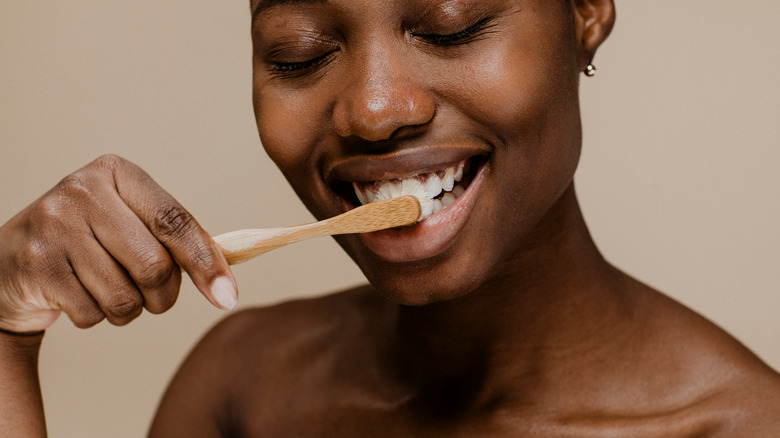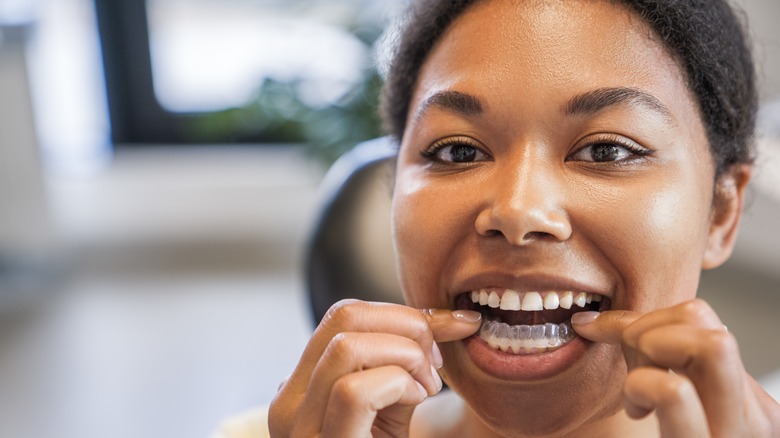The Teeth-Whitening Mistake You're Probably Making When Brushing
Beauty standards are ever-changing. What was considered beautiful a decade ago has been completely turned on its head. As a society, we're gradually embracing beauty in all shapes and forms, and that's a wonderful thing. Everybody deserves to feel confident and happy in their own skin. Only when we've accepted ourselves the way we are can we truly begin to accept that beauty lies in the eyes of the beholder. In a world where the definition of beauty changes like the weather, it's rare to see one stand the test of time.
But, for the most part, having pearly white teeth has managed to do just that. Everybody from screen sirens like Doris Day to modern-day beauties like Julia Roberts and Kerry Washington flashes their perfectly white chompers at every opportunity. It's quite rare to find a leading media personality with anything short of the perfect set of white teeth. But it's not just the aesthetic benefits that send people in pursuit of that bright smile; many assume that it's a sign of good oral health too.
In reality, white teeth don't necessarily equate to healthy teeth. The color of your teeth is determined by natural factors like age and genetics and external irritants like the food and drinks you consume. While brushing and flossing will make a difference to smaller stains, you might have to pull out the big guns for a more effective solution. Just don't make this common mistake or you'll be fighting a losing battle.
Avoid these brushing mistakes for whiter teeth
If you were to look up natural ways to brighten your teeth, you'd most likely find brushing with baking soda to be high in the results. While baking soda might help with bringing temporary whiteness to your smile by cleaning surface stains like those created by coffee and food, it can ultimately do more harm than good. Regular brushing with baking soda can slowly chip away at the enamel to weaken your teeth and lead to painful sensitivity. For a safer option, use toothpaste with baking soda instead.
Another easy-to-make mistake is brushing your teeth with whitening products every day. It's easy to assume that using more teeth whitening will only give you brighter and cleaner results, but it might not serve your best interests. In order to bring brightness to your smile, these products have to be packed with harsh ingredients. Over time, these chemicals have the potential to cause enamel damage, gum recession, and sensitivity. To reduce the damage, you should use a soft-bristled toothbrush with minimal pressure.
When using teeth whitening strips, avoid keeping them on for too long to prevent white splotches. For effective application and absorption of teeth whitening products, your teeth also need to be as clean as possible. As Jennifer Berg, RDH, and dental hygienist, explained to Real Simple: "If there is residue on your teeth, it will prevent the whitening product from seeping into your tooth's enamel and down to the stains."
Follow these tips for smarter teeth whitening
Another damaging home remedy is the overconsumption of acidic food like vinegar and fruits for cleaner teeth. You may find that they brighten your teeth temporarily, but just like baking soda, they're actually damaging your enamel and contributing to problems like sensitivity and cavities. Generally speaking, you should steer clear of any solution that isn't specifically formulated for your teeth. So, avoid the use of hydrogen peroxide and bleach for whitening.
A common and relatively safe solution you can find almost everywhere is whitening trays, but they may not give you the results you seek unless you get them custom-made by a dentist. As Jennifer Berg warned Real Simple, "Using a tray that isn't custom to your mouth can cause leakage of the whitening product chemicals, which can lead to tooth damage and gum irritation." She added, "Additionally, saliva can deactivate the whitening properties in the peroxide."
If you choose to go for an at-home solution, it's important to consult with your dentist to ensure that it's not only the right fit but also safe and effective. Regardless of whether you're using a home solution or undergoing a professional dental procedure, you should know that it's not a one-and-done. You'll most likely have to get touch-ups for the procedure, possibly take daily precautions, and consistently have to follow a dentist-recommended at-home regime.


